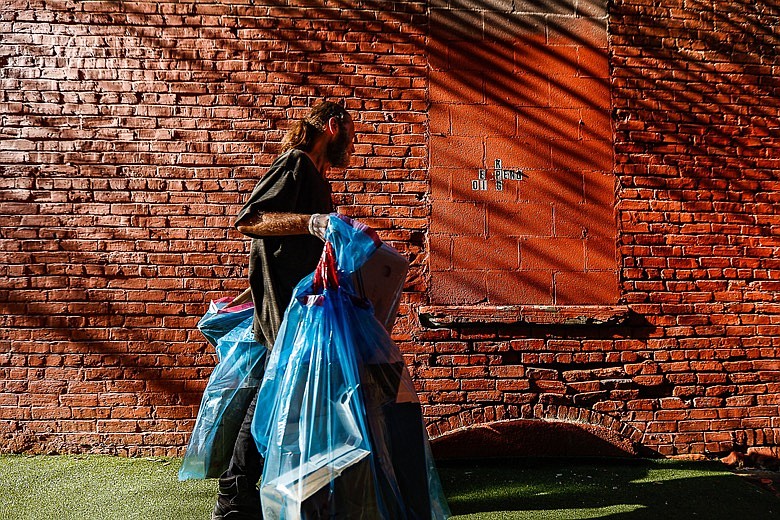Mitch Crist picks up trash downtown several mornings a week, trading up to five full trash bags for $4 each once he wraps up his rounds.
"I do it pretty much every day," Crist said. "I like going down to Mellow Mushroom to buy a couple of beers, or to Dollar General or Bantam and Biddy to get something to eat."
Crist has become a regular in the Cash for Trash program the Downtown Chattanooga Alliance started piloting in March, said Steve Brookes, executive director of the alliance. Like most participants, Crist is homeless and spends his days and nights on the city's streets.
"I think the feedback I hear the most is they feel better about themselves," Brookes said of program participants. "They made their own money today, they didn't have to ask for it or get a handout."
Brandy Burgans, the owner of Mellow Mushroom on Broad Street, said she appreciates the opportunity to support a program that helps people in her community.
"They don't have any nefarious intent, they just don't have anywhere to live," she said. "It doesn't matter what they wear or have or don't have, they're our community, they're locals."
The downtown Cash for Trash program is similar to one he launched in Boston earlier in his career, Brookes said.
Ambassadors with the downtown alliance meet Monday through Thursday mornings with people who want to participate to give them bags to fill. They meet again at noon to collect them and load prepaid cards provided by Chattanooga-based Transcard with the money they've earned.
The cards are good at 23 downtown businesses that have agreed to participate in the program, Brookes said.
"They're cleaning up the city, and they're spending those redemption dollars back into the businesses downtown," Brookes said. "It also helps prevent panhandling. There's less of that when this program is taking place."
The city has also picked up the program outside the boundaries of the Downtown Chattanooga Alliance, trying it out sporadically in areas where litter is a problem and people experiencing homelessness can use a way to earn a little money for necessities, said Sam Wolfe, director of Homelessness and Supportive Housing for Chattanooga.
"We have been doing different iterations on the 11th Street location in front of the community kitchen," he said. "We saw a lot of success with that the few times we employed that, and we're looking to expand to other locations."
The Downtown Chattanooga Alliance has budgeted about $4,000 a month for the downtown program through the end of the year and spent about $6,600 from March to July when it first piloted Cash for Trash, Brookes said.
The program has its challenges, he acknowledged. Some people have pulled large boxes from trash cans to fill their bags, and the ambassadors talk with them about the kinds of trash they'll accept. Ambassadors generally give people some guidance before they refuse to take a bag, Brookes said, with a goal of helping make the program beneficial to everyone.
"It will always be a work in progress," he said.
John Hess, who has been homeless for two years, said he started picking up trash when the program began back in March, and he uses the money for toiletries and other daily needs.
"It does help out the city," he said. "I don't like living in a dump."
The program is a promising way to curb litter and help people in need, but the larger issue of homelessness has gotten more severe during the pandemic, Wolfe said.
In March, the annual point-in-time count of area homeless people by the Chattanooga Regional Homeless Coalition showed a more than 80% increase in unsheltered individuals in Hamilton County, from 201 in 2020 to 364 in 2021. Bradley County's unsheltered population more than doubled, from 51 in 2020 to 120 in 2021.
"Any time we can find opportunities to engage people experiencing homelessness in our community in a variety of ways that give them opportunities to work and engage and be a part of the larger community, that's phenomenal," Wolfe said. "They care about their space and want it to look good. The No. 1 thing we get requests for to our outreach workers is trash bags."
Crist said the program has helped him get a new identification card - something he had wanted to do for years.
"I haven't had one for 15 years, but I made some money and went to the old courthouse," he said. "Cost me 16 bucks, but it was easy."
Contact Mary Fortune at mfortune@timesfreepress.com. Follow her on Twitter at @maryfortune.
